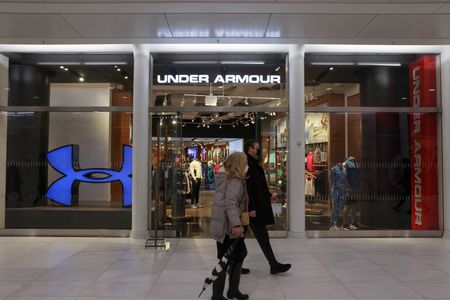 1
1 1
1

(Reuters) -Under Armour Inc on Friday warned that higher transportation costs would squeeze its earnings in the current quarter, as the sportswear maker wrestles with COVID-19-led disruptions to its supply chain.
Shares fell 8.1% to $18.40 as the company flagged reductions to its spring and summer order book due to supply constraints.
Product availability has been a concern for Under Armour and its rivals, Lululemon Athletica Inc and Nike Inc, as Asian factories that make their clothing are only just recovering from COVID-19 outbreaks and employee shortages.
“We expect many of (supply) headwinds to continue well into fiscal 2023 until longer-than-usual transit times, backlogs and congestion find balance … and inbound shipping delays subside,” said Chief Financial Officer David Bergman on an earnings call.
The pandemic has triggered inflation across the supply chain from labor to raw materials, forcing corporate America to raise prices of everything from burgers to hoodies. However, many companies could still not fully offset the impact and that hit their profits.
Under Armour said gross margin would be down 200 basis points in the current quarter, compared with last year’s adjusted gross margin, hurt by a 240 basis points hit from higher freight expenses.
It forecast earnings of 2 cents to 3 cents per share for the quarter ending March 31, which at least four analysts said was below estimates.
The company has been forced to use pricier air freight due to port congestion, as it strives to ensure its shelves are sufficiently stocked, with demand for athletic wear still strong.
However, robust demand and higher prices helped Under Armour post better-than-expected results for the holiday quarter.
Net revenue rose 9% to $1.53 billion, beating estimates of $1.47 billion, according to Refinitiv IBES data. Adjusted earnings per share stood at 14 cents, five cents above expectations.
(Reporting by Ananya Mariam Rajesh and Praveen Paramasivam in Bengaluru; Editing by Amy Caren Daniel)